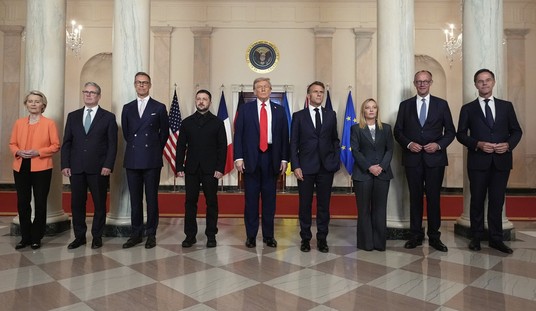The Supreme Court has had a busy morning deciding what they won’t do. First they declined to block Cyrus Vance’s subpoenas for Donald Trump’s tax records, and then they cleared the decks of the remaining challenges to election results. That made it a very bad day for the former president, but perhaps also for those hoping to settle one important question in Pennsylvania:
The Supreme Court has formally rejected several appeals from Republicans and former President Donald Trump over contested 2020 voting rules in key battleground states.
The court declined to take up a challenge to Pennsylvania’s mail ballot deadline extension that became the fixation of Republican attempts to overturn results in that state. The justices also turned away a case out of Georgia, brought by Trump ally Lin Wood, over mail-in ballot requirements.
And, the court rejected Trump’s suit against President Joe Biden over the counting of absentee ballots in Wisconsin.
Perhaps the court thought that accepting one case would require them to hear the whole kit and caboodle of conspiracy-theory challenges. Those claims could easily be put aside, however, while other issues really do require some consideration. The decision to refuse cert drew dissents from conservatives on the court, who warn that the issues of rulemaking over legislation will come up again and might create even more damage the next time out:
While the election is obviously settled, many Republicans had hoped the justices would resolve the dispute over changes in voting rules promulgated by state courts or other non-elected bodies — changes they argue are illegal because they weren’t legislated.
“Now, the election is over, and there is no reason for refusing to decide the important question that these cases pose,” wrote Justice Samuel Alito in a dissent joined by Justice Neil Gorsuch.
Clarence Thomas objected strenuously to the decision to deny cert in the Pennsylvania case, which got punted on a 4-4 decision prior to the election. The question of rules changes on absentee ballots didn’t impact the election outcome this time, Thomas wrote, but the court’s luck will run out — and they might be sorry to have to intervene when the court really could change the outcome:
The justices offered no public explanation for their rejection of the cases, but one member of the court, Justice Clarence Thomas, dissented. He said the court should have granted review, even though the dispute was effectively moot, and he took a swipe at his colleagues for the decision to pass up the cases.
“That decision to rewrite the rules seems to have affected too few ballots to change the outcome of any federal election But that may not be the case in the future,” Thomas wrote. “These cases provide us with an ideal opportunity to address just what authority nonlegislative officials have to set election rules, and to do so well before the next election cycle. The refusal to do so is inexplicable.”
It’s even more inexplicable, Thomas continues, given the split in the appellate circuit on precisely this point:
The Eighth Circuit split from the Pennsylvania Supreme Court, granting a preliminary injunction against an attempt by the Minnesota Secretary of State to extend the legislature’s deadline to receive ballots by seven days. Carson v. Simon, 978 F. 3d 1051, 1059–1060, 1062 (2020). This divide on an issue of undisputed importance would justify certiorari in almost any case. That these cases concern federal elections only further heightens the need for review. …
Third, and perhaps most significant, postelection litigation sometimes forces courts to make policy decisions that they have no business making. For example, when an official has improperly changed the rules, but voters have already relied on that change, courts must choose between potentially disenfranchising a subset of voters and enforcing the election provisions—such as receipt deadlines—that the legislature believes are necessary for election integrity. That occurred last year. After a court wrongly altered South Carolina’s witness requirement for absentee ballots, this Court largely reinstated the original rule, but declined to apply it to ballots already cast. Andino v. Middleton, ante, p. ___. Settling rules well in advance of an election rather than relying on postelection litigation ensures that courts are not put in that untenable position.
Thomas concludes by wondering what the court wants to have happen before settling this question:
One wonders what this Court waits for. We failed to settle this dispute before the election, and thus provide clear rules. Now we again fail to provide clear rules for future elections. The decision to leave election law hidden beneath a shroud of doubt is baffling. By doing nothing, we invite further confusion and erosion of voter confidence. Our fellow citizens deserve better and expect more of us. I respectfully dissent.
Justice Alito argues in a concurrence to Thomas’ dissent that the cases are not at all “moot,” thanks to these issues being left unresolved. And he also foresees the same issues arising again, perhaps in even more difficult circumstances:
For these reasons, the cases now before us are not moot. There is a “reasonable expectation” that the parties will face the same question in the future, see Wisconsin Right to Life, Inc., 551 U. S., at 463, and that the question will evade future pre-election review, just as it did in these cases.
That’s not just a safe bet — it’s a certainty. And when it does, we’ll all live to regret it, not just the six justices who punted this yet again.









Join the conversation as a VIP Member